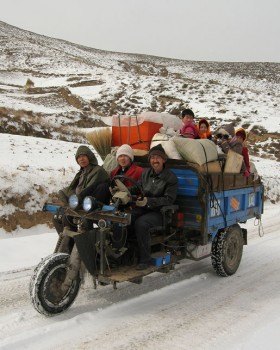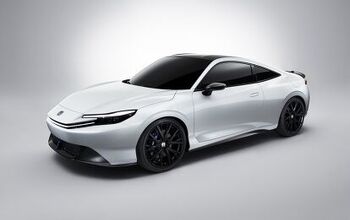No License? Chinese Police: "We'll Teach Ya"

The Chinese government wanted to create demand for an extra million vehicles per year with their “cars to the countryside” program. It goes like this: farmers who replace their three-wheeled vehicles for light commercial vehicles receive a maximum subsidy of 5,000 yuan ($731). Not enough to spur consumption? “For cost-sensitive farmers, a 10-percent subsidy is enough and would be effective to boost demand,” said Tan Jijia, an auto analyst at Pacific Securities Co. He was wrong. There is another problem . . .
Farmers in China rarely have driver’s licenses. Of the approximately 1.5 bn people living in China, only slightly more than 100 million are licensed to drive a car. Other than in the big cities, which clog daily with traffic, cars can still be an oddity in some rural towns. Even in larger cities more inland the preferred type of a taxi is the backseat of a motorcycle. That became apparent after the “cars to the countryside” wasn’t the roaring success it was hoped.
The lack of licenses won’t deter the Chinese; the Ministry of Public Security will dispatch policemen to the countryside to give farmers easier access to driving license examinations, Gasgoo writes. Even mobile offices for vehicle registration will be set up in rural parts of China. Normally a driving school teaches driving, and police stations issue the permits.
Unfortunately, there are no driving schools and very few police stations in the Chinese countryside. Between 55 and 80 percent—depending on whom you ask and who does the counting—of China’s population lives in rural areas. Even tier-3 cities often lack an essential element to car ownership: car dealers.
This should serve as another indicator that China, for the months of January and February the world’s largest auto market, is largely untapped.

Bertel Schmitt comes back to journalism after taking a 35 year break in advertising and marketing. He ran and owned advertising agencies in Duesseldorf, Germany, and New York City. Volkswagen A.G. was Bertel's most important corporate account. Schmitt's advertising and marketing career touched many corners of the industry with a special focus on automotive products and services. Since 2004, he lives in Japan and China with his wife <a href="http://www.tomokoandbertel.com"> Tomoko </a>. Bertel Schmitt is a founding board member of the <a href="http://www.offshoresuperseries.com"> Offshore Super Series </a>, an American offshore powerboat racing organization. He is co-owner of the racing team Typhoon.
More by Bertel Schmitt
Latest Car Reviews
Read moreLatest Product Reviews
Read moreRecent Comments
- Honda1 Unions were needed back in the early days, not needed know. There are plenty of rules and regulations and government agencies that keep companies in line. It's just a money grad and nothing more. Fain is a punk!
- 1995 SC If the necessary number of employees vote to unionize then yes, they should be unionized. That's how it works.
- Sobhuza Trooper That Dave Thomas fella sounds like the kind of twit who is oh-so-quick to tell us how easy and fun the bus is for any and all of your personal transportation needs. The time to get to and from the bus stop is never a concern. The time waiting for the bus is never a concern. The time waiting for a connection (if there is one) is never a concern. The weather is never a concern. Whatever you might be carrying or intend to purchase is never a concern. Nope, Boo Cars! Yeah Buses! Buses rule!Needless to say, these twits don't actual take the damn bus.
- MaintenanceCosts Nobody here seems to acknowledge that there are multiple use cases for cars.Some people spend all their time driving all over the country and need every mile and minute of time savings. ICE cars are better for them right now.Some people only drive locally and fly when they travel. For them, there's probably a range number that works, and they don't really need more. For the uses for which we use our EV, that would be around 150 miles. The other thing about a low range requirement is it can make 120V charging viable. If you don't drive more than an average of about 40 miles/day, you can probably get enough electrons through a wall outlet. We spent over two years charging our Bolt only through 120V, while our house was getting rebuilt, and never had an issue.Those are extremes. There are all sorts of use cases in between, which probably represent the majority of drivers. For some users, what's needed is more range. But I think for most users, what's needed is better charging. Retrofit apartment garages like Tim's with 240V outlets at every spot. Install more L3 chargers in supermarket parking lots and alongside gas stations. Make chargers that work like Tesla Superchargers as ubiquitous as gas stations, and EV charging will not be an issue for most users.
- MaintenanceCosts I don't have an opinion on whether any one plant unionizing is the right answer, but the employees sure need to have the right to organize. Unions or the credible threat of unionization are the only thing, history has proven, that can keep employers honest. Without it, we've seen over and over, the employers have complete power over the workers and feel free to exploit the workers however they see fit. (And don't tell me "oh, the workers can just leave" - in an oligopolistic industry, working conditions quickly converge, and there's not another employer right around the corner.)































Comments
Join the conversation
superbadd75: "...have not only never driven..." Hmmm... the way I read it, they drive all the time. They just have never been licensed to do so. Who knows, they might be pretty skilled at handling those things.